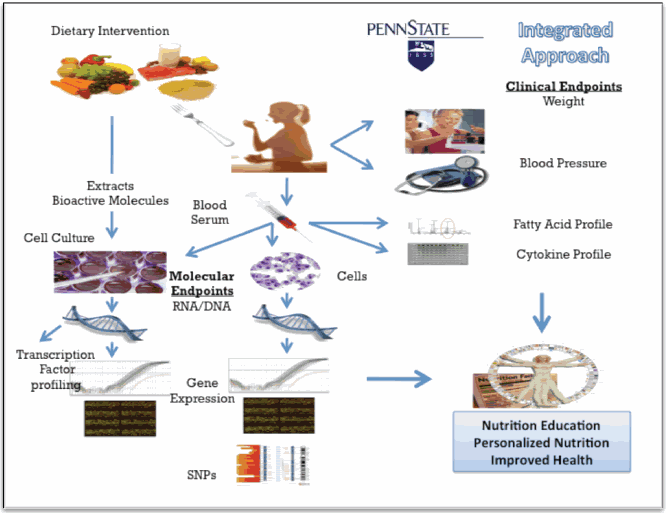Clinical Human Nutrition has been strength at Penn State University for many years. The General Clinical Research Center (GCRC, currently transitioning into an NIH sponsored Center for Translational Sciences Institute) is the starting point for many of the studies performed within the CEN.
The GCRC at University Park is housed in the Elmore Clinical Research Wing of the Noll Physiological Research Center. The three-‐story, 14,000 square foot GCRC facility, which opened its doors in the fall of 1998, provides personnel support and facilities for research with human subjects. While the GCRC is based in the College of Health and Human Development and receives significant support from the College, the GCRC aims to be a resource for all investigators from any college or campus who are doing research in human disease and wellness.
The approach taken by the Penn State nutrigenomic researchers is to integrate classical clinical endpoints with molecular biology studies for improving nutrition education and human health.
Services currently available include:
- Clinical Services (project consultation with physicians and nurses, physical exams, stress tests, medication administration, all nursing procedures including blood drawing)
- Nutrition Services (food preparation, counseling, diet analysis) ▪ Study coordination (Study coordinators available)
- Help dealing with IRBs, including consent form and other document preparation
- Off-‐site Services (where physically possible GCRC personnel can carry out procedures at remote sites)
- Ancillary Tests (blood tests, etc.)
- Blood, urine and other processing, storage or shipping
- Biostatistics support
- Bone density measurement (DXA)
- Ultrasound

The integration of clinical nutrition with cell and molecular biology is the hallmark of PSU's CEN. As shown in the figure to the left, and described in "Research Successes", at the heart of our studies is the disease or condition that we want to address by dietary intervention or supplementation. Past and on-‐going research has focused on various aspects of Metabolic Syndrome including diabetes, chronic inflammation, overweight and obesity, hypertension and cancer. Although the projects performed by members of the CEN have examined a variety of different dietary factors, the vast majority of research has focused on alterations in fatty acid profiles. Omega-‐3 polyunsaturated fatty acids (w3-‐PUFAs) such as those found in fish oil and tree nuts, conjugated fatty acids and mono-‐unsaturated fatty acids have all been associated with health benefits and are areas of interest and expertise within the CEN. The staff at the PSU GCRC assist in developing and implementing the intervention and classical clinical endpoints and biomarkers are analyzed to address effectiveness of the diet. Integrated into the research project are molecular techniques, that together with the classical endpoints, help to improve nutrition education and bring the possibility of personalized

